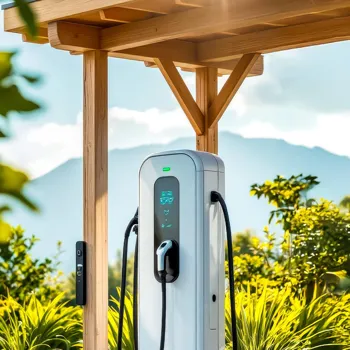Discover the power of sustainability for your business in India. Learn 10 eco-friendly practices to boost profits and the planet
In today's India, businesses both big and small are not just about profits
anymore. People want to support companies that care about the planet. Going green isn't just a nice thing to do; it's actually good for your bottom line and creates a positive image.

Customers are leaning more towards eco-friendly brands, and regulations are getting stricter on environmental norms. This article will guide you through ten simple yet impactful sustainable practices that can help your business thrive while protecting Mother Earth.
Think of it as 'saving the planet, one business at a time'. Businesses should adopt sustainable practices not because of regulations but because it makes good business sense. It showcases corporate social responsibility which is valued by consumers.
Switch to paperless office for efficiency, savings, and eco-consciousness
In today's digital age, the move to a paperless office is not only smart but also very easy. Think about how much paper your office consumes every month – bills, invoices, memos, reports. It's a lot, right?
By switching to digital platforms for communication, documentation, and storage, you can significantly reduce your paper consumption. Implement digital invoicing systems, use cloud storage for documents, and encourage employees to take notes on their laptops or tablets.
You can even use project management software to track tasks and share updates instead of printing out reports. Not only does this saves trees, but it also makes your office more organised and efficient.
Imagine a world where employees can access any document with just a few clicks, no more rummaging through piles of papers looking for that one important file.
Plus, it also saves money on printing costs, paper, and filing cabinets, that money can be used for better things such as bonuses for employees and upgrading equipment. A paperless office is a modern office, and it shows that your company is forward-thinking and environmentally conscious.
Saving energy through simple steps in business for cost savings & eco-friendly impact
Saving energy is one of the easiest and most effective ways to reduce your business's environmental footprint and cut down on operational expenses. Start with the basics: switch to LED lighting. LED bulbs use significantly less energy and last much longer than traditional bulbs.

Install occupancy sensors in offices, meeting rooms, and washrooms so lights automatically turn off when no one is around. Encourage employees to turn off computers, monitors, and other electronic devices at the end of the day.
Consider investing in energy-efficient appliances and equipment, such as refrigerators, air conditioners, and HVAC systems. Implement a smart thermostat that automatically adjusts the temperature based on occupancy.
Even small changes like these will make a big difference in your energy consumption and electricity bills. You can also explore renewable energy options such as solar panels for your office building, it's an investment with returns and is good for public image.
Educate your employees about energy-saving habits and encourage them to adopt those at home as well, creating a ripple effect of positive change.
Embrace reduce, reuse, recycle for sustainable waste management in business
The principle of "Reduce, Reuse, Recycle" is not just a catchy slogan; it's a fundamental approach to waste management that every business should embrace. Start by reducing the amount of waste your business generates.
Think about ways to minimise packaging, use reusable containers and utensils, and avoid single-use plastics. Encourage employees to bring their own water bottles and coffee mugs instead of using disposable cups. Reuse items whenever possible.
Instead of throwing away old office supplies, find creative ways to repurpose them. Use scrap paper for notes or drafts, and donate old furniture or equipment to charity. Set up a comprehensive recycling program in your office.
Provide clearly labelled bins for paper, plastic, glass, and metal, and educate employees about proper recycling procedures. Partner with a local recycling company to ensure that your recyclables are properly processed.
By implementing a robust waste management system, you can significantly reduce the amount of waste your business sends to landfills, conserving resources and reducing pollution. This also saves money.
Businesses in India must conserve water by fixing leaks, using efficient appliances, and promoting awareness
Water is a precious resource in India, and businesses have a responsibility to use it wisely. Simple steps can make a big difference. Fix leaky faucets and pipes promptly to prevent water wastage. Install low-flow toilets and faucets in washrooms.

Consider collecting rainwater to use for gardening, cleaning, or other non-potable purposes. If your business has a garden or landscaping, use drought-tolerant plants and implement efficient irrigation systems.
Encourage employees to be mindful of their water usage, especially in washrooms and pantries. Educate them about water conservation tips and promote a culture of water awareness in the workplace. Look into water-efficient appliances such as washing machines.
If your business uses a significant amount of water for industrial processes, explore ways to recycle and reuse water. You can implement closed-loop systems to minimize water consumption and reduce wastewater discharge. The little things add up to a lot of water saved.
Choose sustainable products to support eco-friendly businesses
What your business buys matters. Opt for products and materials that are sustainably sourced, which can minimise their environmental impact. When purchasing office supplies, choose recycled paper for products made from recycled materials.
Look for products that are certified by reputable organizations, such as the Forest Stewardship Council (FSC) for paper products or the Fair Trade certification for coffee and tea. Support local businesses and suppliers who are committed to sustainable practices.
This reduces transportation costs and environmental impact of shipping products from far away. Ask your suppliers about their environmental policies and practices. Choose suppliers who have a strong commitment to sustainability and who are transparent about their supply chains.
Consider the entire lifecycle of products when making purchasing decisions. Choose products that are durable, repairable, and recyclable and consider purchasing equipment that is energy efficient.
By making informed and responsible purchasing decisions, you can help drive demand for sustainable products and support businesses that are committed to protecting the planet.
Encourage sustainable transportation to reduce carbon footprint
The way your employees and products travel to and from work impacts your carbon footprint. Encourage employees to use public transportation, carpool, bike, or walk to work whenever possible; you can even offer incentives to those who do.
Consider implementing a work-from-home policy to reduce the number of employees commuting to the office. If your business operates a fleet of vehicles, look into electric or hybrid vehicles to save on fuel. Optimise your delivery routes to minimise fuel consumption and emissions.
Consolidate shipments whenever possible and explore alternative transportation options, such as rail or intermodal shipping. Consider offsetting your carbon emissions by investing in carbon reduction projects, such as renewable energy or reforestation.
By implementing sustainable transportation practices, you can significantly reduce your business's contribution to greenhouse gas emissions and improve air quality.
Digital documentation saves trees, reduces energy use, waste, and water consumption, while supporting sustainability
Let's summarise what we have learnt. Digital documentation helps save trees and makes document retrieval simpler and faster. LED lights, smart sensors, and turning off electronics when not in use can drastically cut energy bills.
Reduce waste by minimising packaging, reusing items, and setting up a robust recycling program. Fix leaks, install low-flow fixtures, and collect rainwater to conserve water and remember to educate employees about it. Opt for recycled and sustainably sourced items and support local businesses.
Last but not less important, encourage employees to use public transport and use efficient cars. By adopting these practices your business makes the world a little better.
AI Generated Content. Glance/InMobi shall have no liability for the content














